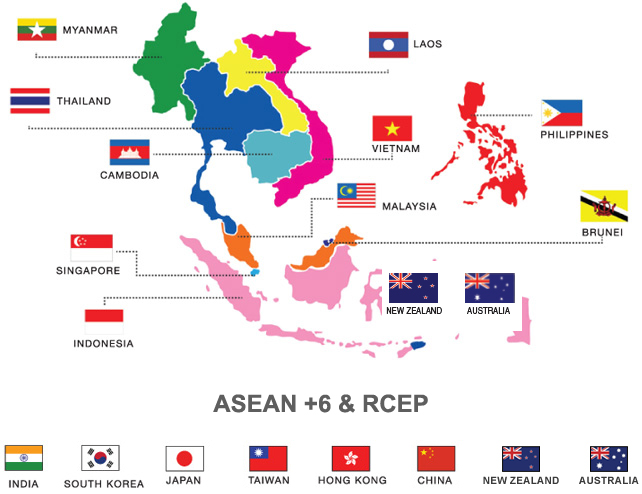Regional Comprehensive Economic Partnership
- RCEP is the proposed mega-regional Free Trade Agreement (FTA) between 16 Asia-Pacific countries.
- It includes India, China, Japan, South Korea, Australia, New Zealand and the 10-member ASEAN bloc.
- The RCEP negotiation process had started in 2013 and is unlikely to be concluded by the end of 2016.
- The proposed FTA aims to open up trade in goods and services as well as liberalise investment policies.
- It will cover a market of over 3 billion people in these 16 countries — whose total combined GDP is more than $17 trillion and collectively account for 40% of world trade.
- Negotiations on the RCEP have entered a decisive phase.

India should join RCEP because:
- Allows India to diversify markets in Southeast Asian countries and garnering benefits of common FTA over the whole region
- Enable India to become a member of global production networks by scattering the production chains in different countries
- Lenient time limits for attaining labour and environmental standards along with provision of protecting small industries would allow India to secure domestic interests
- Joining the bloc will give boost to ‘Act east policy’ and would acts as shield against losses due to Trans Pacific Partnership
India should not join RCEP because:
- Study by Commerce Ministry indicates that it can lead to a revenue loss of 1.6% of the GDP
- Joining the bloc can result in cheaper imports from China as China offers low price and better quality
- Competition with Indonesia and Philippines can reduce the benefits of service trade within the bloc
- Domestic issues may arise due to such alliance such as harm domestic manufacturing, leather industry etc.
- Ambiguity in the definition of balanced outcome with respect to downscaling of tariffs
- 15 Asia-Pacific nations including India fear that China may dump its excess capacity in several items including steel, as well as highly subsidised items which may harm local industry of importing countries and distort trade.
What are the concerns that remain?
- The first is the greater access Chinese goods will have to the Indian market, a problem given India’s massive trade deficit. To circumvent this, given that India is the one country that doesn’t have an FTA with China, the government has proposed a “differential market access” strategy for China, which others are inclined to accept. After the Wuhan summit, India and China have made progress on addressing the trade deficit, with China increasing access for Indian goods such as pharma and agricultural products.
- The second concern is about demands by other RCEP countries for lower customs duties on a number of products and greater access to the market than India has been willing to provide.
- The more developed RCEP countries such as Australia and Singapore have been unwilling to accommodate India’s demands to liberalise their services regime and allow freer mobility of Indian workers.
- Some of the RCEP countries, including India, are headed for elections next year, a point where governments traditionally turn protectionist.
Why India should not walk out of the RCEP talks?
- Despite these concerns, the Indian government must take into account the deeper strategic pitfalls of either slowing down India’s RCEP engagement or walking out of the talks at this stage.
- India must not take the easiest way out on the trade deal and walk out of talks. Walking out would cut India out of the rules-making process for the RCEP and give China further space in the regional trade and security architecture.
- At a time when the U.S. has broken from the global concord on multilateral trade agreements, an Indian walkout would endanger the united message that RCEP countries, which represent 40% of the global GDP, would wish to send out.
- The push for trade blocs has acquired a new urgency, with the Trump administration unleashing a trade war of sorts against China and even the EU.
- It would also be a sharp departure from India’s “Act East” slogan and its extended outreach to ASEAN.
- If the RCEP countries are keen on a slice of India’s market, they must sweeten the deal.
India pushing for easier travel norms among RCEP nations:
- India is pushing for easier norms on movement of professionals for short-term work in 16 Asia-Pacific nations, under the RCEP
- The Regional Comprehensive Economic Partnership (RCEP) is a proposed FTA
- The RCEP technical level talks are currently going on in Hyderabad
- Possible support from ASEAN countries
- A few ASEAN countries are also supporting India’s proposal for an RCEP Travel Card
- The Travel Card will facilitate visa-free multiple short-term entry across the RCEP region for business and tourism purposes
- Concerns of RCEP Members
- According to some members, Travel card would lead to migration of professionals from India and loss of jobs for locals
- But India has been saying that its demands on temporary movement of professionals and skilled workers should not be confused with permanent movement (or immigration)
Source:
Thank you team. Pls can u share the concepts of linking topics like India ipr issues and other tough concepts of economics